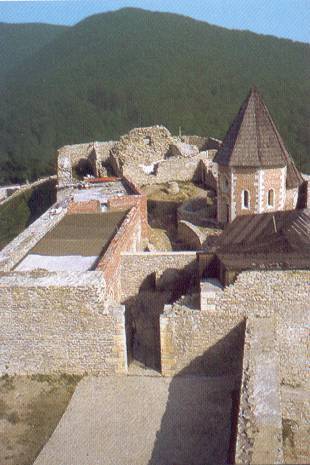

Petar Svacic (c.1091- 1097)
Petar Svacic was the last Croatian king. He assumed the throne amid deep tension throughout the Kingdom. His predecessor, Stjepan II (1089 - 1091) died without leaving an heir, sparking a major political crisis. The crisis was compounded when it was revealed that Jelena, the widow of King Zvonimir (1074 - 1089), was plotting the annexation of Croatia by her brother, King Laszlo I of Hungary. The opportunistic Laszlo used his sister's marriage to Zvonimir as justification for his inheritance of the Croatian Crown.
Meanwhile, Croatia's leading dignitaries and clergy elected nobleman Petar Svacic as King, who immediately deployed the military to defend Croatia's borders from Hungarian attack. However it was too little, too late. Laszlo, who had probably devised a military strategy two years earlier, launched an offensive and managed to breach Croatian lines along the Drava River. The well-prepared Hungarians soon occupied the entire province of Slavonia but were halted by the Croats at Mount Gvozd (nears today's Karlovac).
Shortly after his army's success, Laszlo died (1095), leaving his younger brother Kalman to continue the campaign. Svacic's troops maintained their resistance repelling Hungarian assaults for nearly two years. Kalman grew frustrated at his army's impotence and in 1097 assembled an enormous force at the eastern foot of Mount Gvozd. The subsequent offensive was brutal and absolute, resulting in Petar Svacic's death. His heroism was commemorated in the renaming of Mount Gvozd to Petrova Gora (Peter's Mountain).
Five years of negotiations between Croatia's remaining noblemen and Kalman followed thereafter. Finally, in 1102, an historic settlement was reached (Pacta Conventa) by which the Croats agreed to recognise Kalman as King. In return, he promised to maintain Croatia as a separate kingdom, not to settle Croatia with Hungarians, to guarantee Croatia's self-governance under a ban (governor), and to respect all the rights, laws and privileges of the Croatian Kingdom.
The joint Hungarian-Croatian Kingdom lasted over 800 years, dissolving in 1918.

Medvedgrad Fortress, near Zagreb (13th century)
Previous (Stjepan II)
Copyright © Karl Baricevic. All rights reserved.